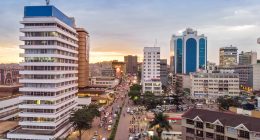Early this year, the anti-poverty charity Oxfam released a research report which showed that by 2016 (which is next year) 1% of the world’s population will own more wealth than the other 99%. This I can say didn’t come as a surprise but only came to confirm our fears. Following the development, Winnie Byanyima the Executive Director Oxfam International launched a passionate campaign to help change the tide. She has however led a more globalized campaign which would need to be contextualized to be relevant to the native Ugandan grappling with the same challenge(inequality) and with this I give practical solutions to inequality in Uganda.
Strengthening Unions
Trade unions are generally put in place to collectively bargain for employees’ interests at their work places. The Uganda National Teachers Union (UNATU) is arguably the strongest union in Uganda today. They have been known for putting their foot on the ground and advocating for better pay even when government has issued various threats including termination of their work contracts. In May, the teachers went on strike paralyzing the learning process country wide for eight straight days the result of which was an 18% pay increment. However, this spirit hasn’t been replicated in other professions like in the health sector which are in dire need of such incentives. Late last week, medical interns at Mulago Hospital went on strike after missing salaries for four months. The Executive Director was quoted by the Daily Monitor on Wednesday, May 20th 2015 as having responded by saying that, “you came here alone so take decisions that affect you alone, no one else.” This kind of attitude can only be tackled with grounded unions that would be able to coerce their employers into maintaining good working conditions.
Social Safety Net
Universal health care is a vital factor in the fight against inequality. A population that can easily access health services would bridge the gap between the minority rich and the majority poor. At the moment the evil corruption is, hasn’t spared Uganda’s health sector. Drugs supplied by government to health centers are stolen by the health practitioners and channeled to private clinics and pharmacies.
Even with the presence of drugs, the level of negligence at these health centers is appalling. In the case of Centre for Health Human Rights & Development & 3others V Attorney General Constitutional petition NO.16 of 2011, a one Ms. Nalubowa was asked for a bribe of Shs60,000 supposedly airtime to call the doctor. Unable to pay the bribe, she was taken to the maternity ward and left unattended where she bled to death. This is one of the very many cases where ordinary Ugandans suffer injustices in the health sector. The president in response to this kind of behavior set up the Health Monitoring Unit under state house to help curb the vice but it can only do too much. A deliberate government intervention to ensure universal quality health care to all should be undertaken soon. The government currently gives out free Anti-Retroviral Drugs to all HIV/AIDS patients but we wait to see if this will be rolled out to other diseases the poor Ugandans have continued to succumb to.
“Statistics from the education ministry in 2012 reported a staggering 71% drop out rate under the Universal Primary education”.
Education is also an important sector to which funds should be invested in order to tame the raging menace inequality is. Since 1996, government has heavily subsidized education starting with Primary education and eventually encompassing secondary school both at O and A level. This has however come with a drastic fall in the quality of education and is also riddled with high dropout rates. Statistics from the education ministry in 2012 reported a staggering 71% drop out rate under the Universal Primary education. In 2006 1,598,636 pupils enrolled for primary one in government aided schools but only 463,322 registered for Primary Leaving Examinations in 2012 which is mind blowing. With this kind of situation, the inabilities to acquire skills and qualifications to enable them have meaningful employment later on life would only serve to perpetuate inequality.
Priority should also be given to the housing sector in Uganda. Shortage of affordable and decent housing, prevalence of slums and informal settlements is a problem the government should focus on. Ezra Suruma in his book “Advancing the Ugandan Economy” asserts that improved housing would help enhance the quality of life and that the money from the oil industry should be put in place to achieve this. The National Social Security Fund has realized the need to intervene in the housing sector and has availed Shs40 billion to construct affordable residential estates across the country. Such projects should be pursued with the passion and zeal they deserve in order to cut on the inequality levels.
Over the years, there have been a number of deliberate government programs to help intervene in Uganda’s agricultural sector but have failed miserably. The latest being the National Agricultural Advisory Services (NAADS) which has been heavily infested by corruption. Savings and Credit Cooperative Organizations normally referred to as SACCOS in Uganda have been kicked off in many parts of Uganda. These help in easing financial access by the rural farmers to help boost production.
However attention should be now channeled to strengthening the accountability systems so that farmers’ hard earned savings are not easily swindled by the managers in charge. Research in the Agricultural sector should be heavily funded to develop alternative sustainable agricultural systems for improving farm profitability and maintaining an adequate, high quality, safe and affordable food supply. With this kind of intervention in the Agricultural sector, income in the rural households would be greatly boosted and thus solving the inequality conundrum.
Pension sector in Uganda can also be an avenue to turn around inequality levels in Uganda. Uganda’s saving culture is really low and somehow the law has been used to save face. But the sector still faces major challenges which supposed to be solved with the proposed pension reform (yours truly disagrees but that is a debate for another day). One of them is helping the elderly better support themselves after retirement. What is normally done is that the retirement benefits are given to the retirees in one bunch which in most cases is suicidal as many who don’t have experience in business quickly invest it and lose it in losses. According to the World Bank statistics Uganda has a working population of approximately 15million people, most of who are in the informal sector and agriculture.
The current pension system comprising of NSSF, the public Service Pension Scheme and occupational voluntary savings cover less than 5% of Uganda’s workforce, mainly urban workers. It doesn’t extend to the majority of citizens, including those employed in the agricultural sector, the self-employed, and those employed in the informal sector. This therefore leaves a bunch of elderly Ugandans left at the mercy of relatives to look after them in the evening of their lives and those who are not lucky enough resort to destitution. NSSF has resorted to ensuring affordable housing units for its pensioners which is a commendable step in the right direction. Practical pension reforms are therefore in order to change the course of events. Income inequality is a beast we need to counter and the sooner we do the better for the pearl.







